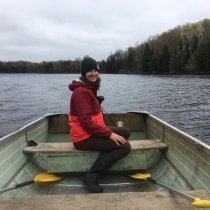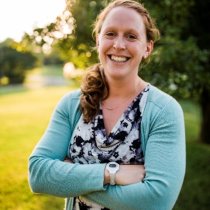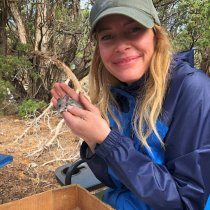Spotlight
Women in Ecology – Corinna Gries
February 3, 2022
Access to high quality, interoperable data is critical to the long-term success of ecology and the STEM community at large. Programs like NEON and NSF's Long-Term Ecological Research program (LTER) provide access to such data, and technology is an essential component of storing, categorizing, and sharing the data at a scale where they can have a global impact.
We spoke with Dr. Corinna Gries, one of the Environmental Data Initiative (EDI) leads at the University of Wisconsin with decades of experience in data management, about the benefits of digitizing data and making it more publicly accessible. Her unique career path provides a window into the increasingly critical—yet often overlooked—intersection of technology, scientific research, and data management in STEM fields. Despite the initial challenges of compiling scientific data on such a large scale, Gries believes that enabling more people to enter STEM fields with holistic mindsets and varied skillsets may be the key to pushing this important work forward.
Q: What inspired you to become involved in your field/the field of ecology?
I grew up in Germany – I went to school and got my Ph.D. there. I spent a lot of time outdoors when I grew up, so I'd say that was how I first got inspired. I enjoyed being outdoors but, at a certain point, it felt like I was watching my favorite river get slowly destroyed over time. Not only was it getting polluted so that we couldn't swim in it anymore, but it was also getting manipulated and engineered and, in the end, it became just a channel for big ships. Each of the sidearms of this river that I had enjoyed so much were blocked, and there was no longer a way to take little boats and explore the wetlands, because there weren't many wetlands left. I'd say watching that happen is what initially drove me to ecology. I graduated from high school majoring in math and biology. Then I went straight to university from there and got a master's degree in ecology and my Ph.D. in ecophysiology.
Q: Tell us a little about your career path and how you came to be in your current role.
After my Ph.D., I did my postdoctoral research in the U.S. at Arizona State University. I stayed there for 21 years while raising my family, and I was supporting myself on grants with collaborators at ASU. During that time, my interest and understanding of computer programming really took off. In the earlier days of personal computers, I got the hang of the technology quickly. Because of this, I was able to do a lot of programming early on in my career.
At one point, I was exposed to a natural history collection at ASU, and I told them that they needed to digitize their data collection and save it to a database. Once I had them convinced, everything sort of went from there – several other people in that area approached me for collaborations, and over time I became the information manager at the Central Arizona Phoenix LTER. This work was also a lot more flexible than fieldwork and experimental work, so it meshed better with my trying to raise a family.
Q: Throughout your career path, who would you say were your most important mentors or influences?
For female influences in my life, there was one woman who had written a textbook that I hugely admired, and I actually saw her in person once at a meeting – that was really exciting. Otherwise, the majority of my professors and mentors at my university were male. One of my mentors ended up being my PhD advisor, and it was through his botany class that I really got interested in ecology. I also had another important mentor; he was a professor who hired me to do interesting student work.
Q: What challenges do you think women face when entering STEM fields? What, if any, have you experienced during your career?
I gather that there is sometimes an assumption that women can't do STEM, but I have never personally encountered that, so I must have had parents who let me do what I wanted to do without ever suggesting that I couldn't do it. My very first math teacher was a woman, and she really got me interested in math. So, I'd never personally experienced that prejudice, and thankfully I don't think I needed any help to get over those kinds of obstacles in my career. Where I did have problems was later on, in getting hired. I wanted to stay in the U.S. because my family was here, but the job search was very difficult. That problem really alleviated itself only after about 10 years of working at ASU, when I then finally became the information manager. In retrospect, that seems to be the first real job I ever had. Until then, it was just some soft money opportunities, a little bit of teaching, etc. Overall, that period of time was very frustrating.
Q: Where can research or academic organizations make improvements to encourage more women to join ecology?
I think the work-life balance is still a big problem for women. I feel that there's this expectation for women to work long hours, maybe even 100+ hours a week. And honestly, I can't see how a part-time professorship would be possible. Most part-time positions are paid part-time, but people still work a lot just to be evaluated properly, and so that whole system probably needs more creative solutions. I'm not quite sure what they are, but the old-fashioned evaluation system I don't think works very well.
The other area of my life is the technology. If you can master needed technology, you can earn much more money outside of academia, such that it's hard to justify staying in academia. That's certainly where I lose some students. Many undergraduates who come in learning how to do data management often go off to do work in other areas.
Q: Can you share more about your current work in data management?
There's a lot to managing not just data, but the researchers themselves. A lot of people first need to be convinced that they should even publish their data - they often feel like their data is not clean enough or that they are not prepared enough. Researchers need to compile a multitude of data and files before they form a data set. Then, they usually want to put their data behind a password, because they aren't yet done with publishing everything that they want to publish on it, which we strongly recommend against in EDI.
These are the kinds of conversations that I often have with people. And those are the two things where it just takes a lot of convincing – that datasets, ecological or otherwise, are important enough to put more work into. Not to mention, people often don't know how to publish, so they're more inclined to just let it go. Published data are a citable research product and will bring in more collaborators, people who are interested in using them, etc. And yes, there are a few stories where people have misused data, but those instances are very few and far between and the open research process can correct those instances. These are all concerns, though, in my field.
Q: What is the most satisfying part of being in your current field? What is the most challenging?
For me, the most satisfying part is when I put data together that are useful to somebody else. I think we have accomplished that in the area of natural history collections. The data are out there and being used a lot, so that has been very rewarding. I don't think we're quite there yet with the ecological data, which is traditionally much more varied.
What I've found most frustrating in data management is cajoling researchers into understanding that digitizing data and making it publicly available is a good thing. Some people find it difficult to understand where we are coming from, and the idea of letting go of hard-won data can become very personal.
Q: What are some of your professional aspirations, and what do you hope to do in your field in the future?
My immediate task is to get the EDI data repository funded again, and there is a lot of proposal writing involved with that. Then, I'm really interested in trying to make data management simpler and more automated, and in working with people that are trying to do this through a more scientific lens, not just the data management lens.
Ultimately, I would really like to take part in getting academic ecological data to flow more into decision making and have more of an influence on where we're going to take this planet. Leveraging outreach, communications, and solid ecological understanding would actually be a very valuable combination of skills that I think we're just missing out on in our fields, in my opinion.
Q: What tips or advice would you share to women as they enter these challenging fields, from going through that and having to essentially pioneer some of it yourself?
I would advise younger people entering STEM to develop two or more strong skill sets that combine into something that's slightly different than what most others do. One thing that has helped me a lot was having a combination of skill sets. I knew the technology to a certain degree, and then I had an environmental science background, with a good understanding of how ecological research is done and much work goes into getting this data in the first place.
I would also recommend that women in STEM avoid taking hard times personally. If they don't get a job, it's not because they're incapable. For the first ten years of my career, I remember struggling with the feeling of not being worthy, and that was very difficult. It took some time for me to realize that there's really no reason to turn these things into a reflection of my worth and the value I can bring to the field.
###



